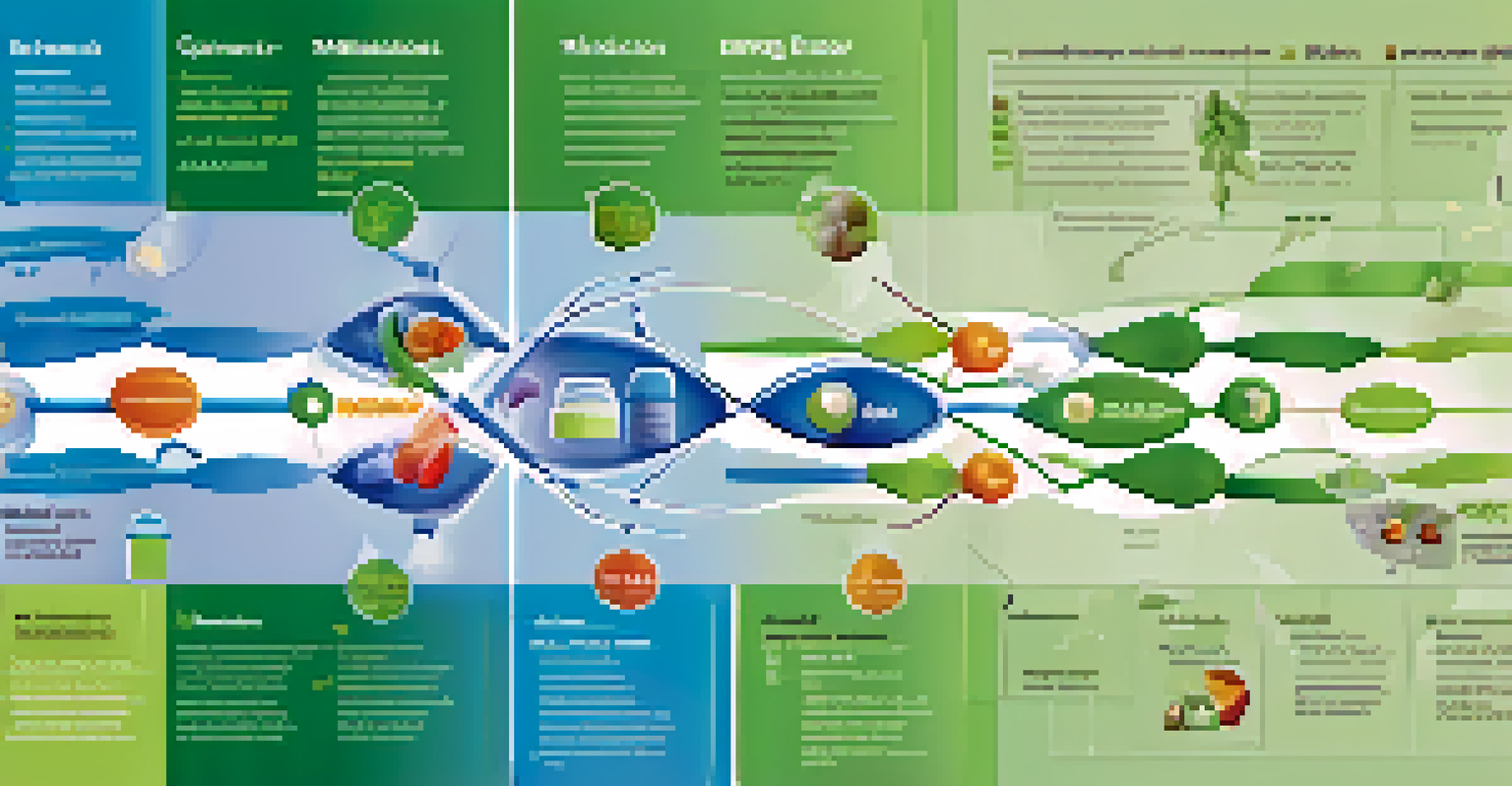Pharmacogenomics: Bridging Genetics and Drug Therapy Effectiveness

What is Pharmacogenomics and Why Does It Matter?
Pharmacogenomics is the study of how our genes affect our response to medications. By examining the interplay between genetics and drug therapy, this field aims to optimize treatment and minimize side effects. Imagine if every time you took a medication, you could know in advance how your body would react to it—that’s the promise of pharmacogenomics.
Pharmacogenomics has the potential to revolutionize medicine by providing personalized treatment strategies based on individual genetic profiles.
Understanding pharmacogenomics can lead to more personalized medicine, where treatments are tailored to the individual rather than a one-size-fits-all approach. For instance, people with certain genetic markers may metabolize drugs differently, impacting their effectiveness and safety. This means a medication that works wonders for one person could be ineffective or even harmful for another, highlighting the importance of genetic insights.
As this field continues to evolve, the potential for improved health outcomes grows. By integrating pharmacogenomics into standard medical practice, healthcare providers can make informed decisions about drug prescriptions, ultimately enhancing patient care and satisfaction.
The Role of Genetics in Drug Metabolism
Genetics plays a critical role in how our bodies metabolize drugs. Enzymes produced by our genes can speed up or slow down the breakdown of medications, influencing their effectiveness. For example, some individuals have genetic variations that cause them to process certain drugs too quickly, rendering the medication ineffective.

Conversely, others may metabolize drugs too slowly, leading to an accumulation of the drug in the body and increasing the risk of side effects. This variability in drug metabolism can help explain why two patients with the same condition may respond differently to the same treatment. Understanding these genetic factors is key to optimizing drug therapy.
Personalized Medicine Revolution
Pharmacogenomics enables tailored drug treatments based on individual genetic profiles, optimizing effectiveness and safety.
Pharmacogenomic testing can identify these genetic variations, allowing healthcare providers to select the most appropriate medications for individual patients. This targeted approach not only leads to better outcomes but also minimizes unnecessary trial and error in finding the right treatment.
How Pharmacogenomics Influences Drug Selection
One of the most significant impacts of pharmacogenomics is its ability to guide drug selection. By analyzing a patient’s genetic profile, healthcare providers can determine which medications are likely to be most effective for that individual. This is particularly valuable in treating chronic conditions such as cancer or cardiovascular diseases, where treatment options can be overwhelming.
Understanding how genetics affects drug response is essential for improving patient care and reducing the trial-and-error approach to prescribing medications.
For instance, in cancer treatment, certain genetic mutations can indicate which targeted therapies may yield the best results. This means that rather than trying multiple treatments that may or may not work, patients can receive a tailored therapy based on their genetic makeup. This not only improves the chances of success but also enhances the patient’s quality of life.
Moreover, informed drug selection can potentially reduce healthcare costs by minimizing the need for ineffective treatments and their associated side effects. As more healthcare providers begin to embrace pharmacogenomics, the hope is that personalized medicine will become the standard of care.
The Impact of Pharmacogenomics on Drug Safety
Safety is a paramount concern in medicine, and pharmacogenomics plays a vital role in enhancing drug safety. By understanding how genetic factors influence drug reactions, healthcare providers can better predict adverse effects and avoid potential hazards. This proactive approach can save lives and prevent complications.
For example, certain genetic traits can predispose individuals to severe reactions to common medications like warfarin, a blood thinner. Pharmacogenomic testing can identify these traits before prescribing such drugs, allowing for adjustments in dosage or alternative treatments. This kind of foresight can dramatically reduce the risk of harmful side effects.
Genetics Influences Drug Response
Genetic variations play a crucial role in how different individuals metabolize medications, impacting their efficacy and potential side effects.
By prioritizing safety through genetic insights, pharmacogenomics not only enhances patient care but also fosters trust in the healthcare system. Patients can feel more confident that their treatment plans are based on their unique genetic profiles, leading to more positive healthcare experiences.
Challenges Facing Pharmacogenomics Implementation
Despite its promise, the implementation of pharmacogenomics faces several challenges. One significant hurdle is the need for widespread education among healthcare providers. While the concept of pharmacogenomics is gaining traction, many practitioners may not fully understand how to interpret genetic test results or integrate them into clinical practice.
Another challenge is the accessibility of pharmacogenomic testing. While costs have decreased, not all patients have equal access to these tests due to geographic, economic, or insurance-related factors. Bridging this gap is essential for ensuring that all patients can benefit from personalized medicine.
Moreover, ethical considerations surrounding genetic testing and data privacy must be addressed. As we navigate this complex landscape, it’s crucial to foster open dialogues among patients, providers, and policymakers to create a framework that supports both innovation and patient rights.
The Future of Pharmacogenomics in Medicine
The future of pharmacogenomics looks bright, with ongoing research and technological advancements paving the way for even more personalized healthcare. As our understanding of genetics deepens, we can expect to see more medications specifically designed to target genetic profiles. This could revolutionize how we approach everything from chronic diseases to mental health conditions.
Additionally, as pharmacogenomic databases grow, healthcare providers will have access to a wealth of information that can inform their prescribing practices. Imagine a future where a simple genetic test can guide doctors in real-time during consultations, ensuring that patients receive the best possible care from the outset.
Challenges in Implementation
The adoption of pharmacogenomics faces obstacles such as provider education, accessibility of testing, and ethical concerns regarding genetic data.
Ultimately, the integration of pharmacogenomics into everyday medical practice has the potential to transform patient outcomes and quality of life. As we continue to embrace this innovative approach, we inch closer to the ideal of truly personalized medicine.
Conclusion: Embracing the Promise of Pharmacogenomics
Pharmacogenomics stands at the intersection of genetics and drug therapy, offering exciting possibilities for personalized medicine. By understanding how our genetic makeup influences drug responses, we can tailor treatments that enhance effectiveness and safety. This approach not only improves patient care but also supports a more efficient healthcare system.
As we move forward, it’s essential for patients and providers alike to embrace the advancements in pharmacogenomics. Education, accessibility, and ethical considerations must be prioritized to ensure that everyone can benefit from these innovations. After all, the ultimate goal is to provide the best possible care for all patients.

In conclusion, pharmacogenomics is not just a scientific concept; it represents a paradigm shift in how we think about medicine. By bridging the gap between genetics and drug therapy, we are paving the way for a healthier, more personalized future.